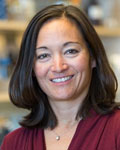Welcome to Cardiology
The Department of Pediatrics Section of Cardiology is recognized for reconstructive heart surgery, heart transplantation, heart catheterization, specialized anesthesia, and nursing for children and young adults with heart disease.
We perform specialized interventions - both surgical and noninvasive - to improve quality of life for children and their families.
Our inpatient clinical services are provided at Children's Hospital Colorado, in Aurora. We are located on the third floor of the main hospital.
Leadership
Shelley Miyamoto MD
Professor of Pediatrics and Head, Section of Cardiology
Co-Director, Heart Institute, Children's Hospital Colorado
The Section of Cardiology functions within the auspices of Pediatric Heart Institute at Children's Hospital Colorado.
The clinical service is designed to provide the highest quality of cardiac care in the most efficient fashion to the more than 11,000 children treated annually: 8,000 at Children's Colorado, 2,500 in community settings in the metropolitan area and 1,000 in the tri-state region.
The Cardiology Department of the Heart Institute has a large outreach program serving both metropolitan Denver and the entire Colorado-Wyoming region. The metro Denver satellites are located in Broomfield, Highlands Ranch, Parker and Wheat Ridge. Broomfield and Parker are open on a half-day basis each week. Highlands Ranch is open five days each week. Wheat Ridge is open multiple days each week. These local offices provided more than 2,500 outpatient visits a year. The regional sites in Basalt, Fort Collins, Glenwood Springs, Greeley, Leadville, and Frisco, Colorado, as well as Casper, Cheyenne, Lander, and Laramie, Wyoming, recorded over 1,000 patient visits last year.
Clinics
- Adult Congenital Heart Disease Clinic
- Arrhythmia Clinic
- Cardiac Catheterization Lab/Interventional Cardiology
- Cardiac Neurodevelopmental Program
- Cardiac Intensive Care Unit
- Cardiac Transplantation
- Cardiomyopathy Clinic
- Echocardiography/Cardiac Imaging
- Exercise Physiology Lab
- Fetal Cardiology Clinic
- Fontan Clinic
- Lipid Clinic
- Hypertension Clinic
- Marfan Syndrome Clinic
- Pediatric Heart Lung Center
- Pulmonary Hypertension Clinic
- Single Ventricle Clinic
- Turner Syndrome Clinic
The University of Colorado School of Medicine's Department of Pediatrics and Children's Hospital Colorado offer a three-year fellowship in pediatric cardiology, which is fully accredited.
The goal of the fellowship is to provide physicians who are board eligible in pediatrics with in-depth training in cardiology that will prepare them for a career in clinical or academic medicine.
We also offer fourth-year of advanced training in:
- Pediatric heart failure and transplant fellowship
- Pediatric advanced imaging fellowship
- Pediatric cardiac intensive care fellowship
- Pediatric interventional congenital cardiology fellowship
- Advanced training in adult congenital heart disease
Training for residents in pediatric cardiology involves intensive clinical training in all aspects of clinical pediatric cardiology, as well as development of clinical and/or basic research skills.
Pediatric cardiology is an integral component of the pediatric clerkship curriculum for third-year medical students at the University of Colorado School of Medicine. Our faculty provides a lecture in cardiology as part of the clerkship's core lecture series.
An elective in pediatric cardiology is available for fourth-year medical students who have successfully completed a pediatric clerkship.
Research efforts are designed to promote more effective treatments for complex heart problems. Clinical research activities in the Cardiac Transplant Program have resulted in new therapies with a friendlier environment, including discharge home for the child awaiting transplantation.
Other transplant-related research has found new avenues of manipulation for the immune system that have strikingly reduced the amount of rejection of the transplanted heart. Basic research on immunologic models is performed in collaboration with the Barbara Davis Center for Childhood Diabetes at University of Colorado School of Medicine (CU SOM). These technologies allow new insights into the process of organ tolerance, giving great hope for possibility of transplantation without chronic immunosuppression, and even the possibility of xenotransplantation.
Both basic and applied experimental studies are conducted on techniques/devices to repair heart defects (i.e., ASD, VSD, HLHS) without surgery. Collaborative efforts with the Biomechanical Engineering Department at the University of Colorado at Boulder, as well as the private community and adult cardiology programs at CU SOM, ensure relevant cutting-edge research in blood flow. Measurements of valve function and arterial remodeling with in vitro mock-up systems offer a greater understanding than would ever be possible in the complex environment of the body.
There is a key basic research initiative to understand the remodeling of pulmonary arteries in response to abnormal pressures and new ways of treating these high pressures. This laboratory research program is conducted in collaboration with a large clinical program to test new drugs for children with pulmonary hypertension.
Additional ongoing studies assess the impact of various heart surgeries on long-term rehabilitation patients and ways to improve diagnostic and interventional catheterizations. There is a major research effort in understanding the circulation of children with only a single ventricle. Particularly, we are performing computer modelling on children whose venous circulation to the lungs is provided by passive flow rather than a right ventricle.
